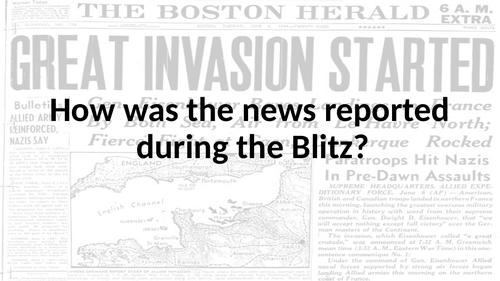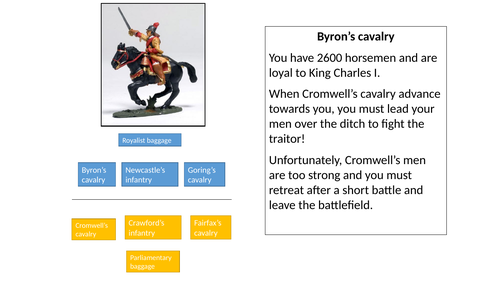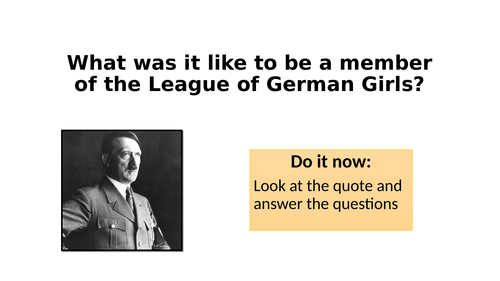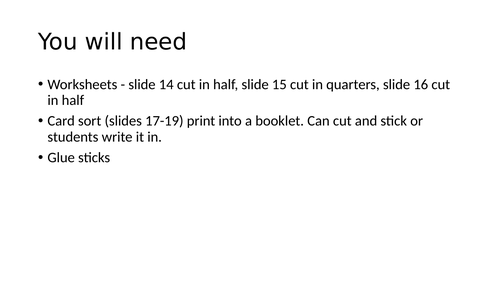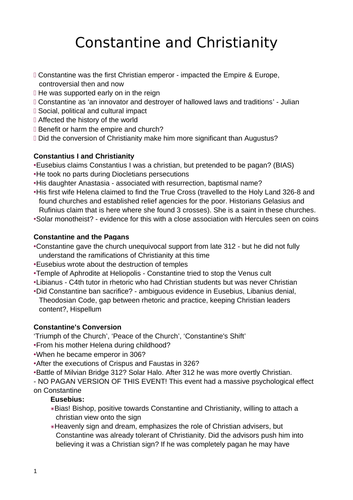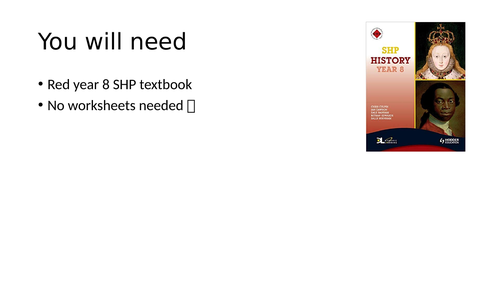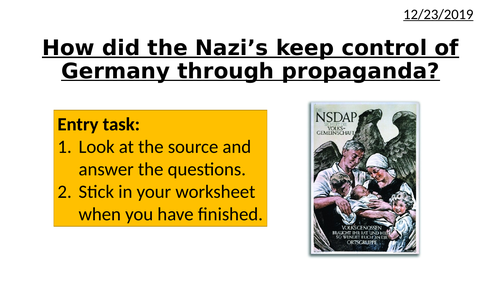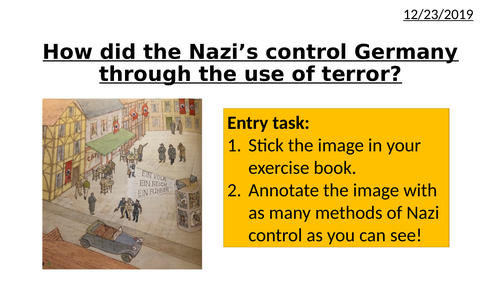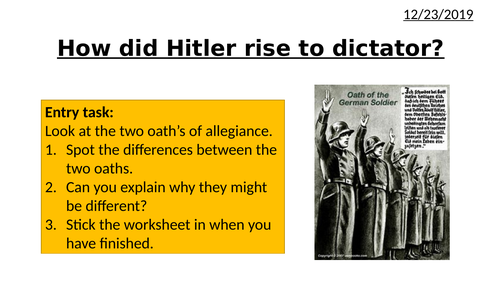338Uploads
103k+Views
37k+Downloads
All resources

How was news reported in the Blitz?
How was the news reported in the Blitz?
Whole lesson plus differentiated tasks and resources.
Perfect for KS3!!

Democracy and Dictatorship
Suitable for teaching 11-16s.
This lesson looks at the difference between democracy and dictatorship and can be used as a starter lesson for introducing Nazi Germany or the Cold War.
The lesson includes activities such as sorting political parties on a spectrum and understanding countries that are a democracy/dictatorship today.
Please review if you buy and check out my other resources.

Battle of Britain
For teaching 11-14s
Why did Britain win the Battle of Britain?
This lesson looks at why Britain won the Battle of Britain. Students begin by understanding the context after Dunkirk and Hitler’s plan (including 2 videos!), then looking at which side was better prepared.
Then students will use differentiated sources (included) to assess why Britain won the Battle of Britain.
Please note 20th Century World textbooks by SHP are needed for 1 task (the which side was better prepared) but the rest of the lesson is fully resourced!
Feedback is welcome; please review if you purchase!

Dunkirk Evacuation
For teaching 11-14s the Dunkirk Evacuation.
Why was Dunkirk in 1940 a triumph for the Allies?
This lesson looks at;
What happened at Dunkirk?
Was Dunkirk a triumph or a defeat? - This is done by looking at film clips from Dunkirk!
Why was Dunkirk portrayed as a victory? - Students look at newspaper headings from the time
How did the news and people ‘portray’ the events at Dunkirk? You need access to the 20th Century World textbooks by SHP for this task.
Please review if purchase, all feedback is welcome. Check out my other WW2 and KS3 lessons and resources.

Battle of Marston Moor
Suitable for 11-14s for the English Civil War. Looks at the importance of the Battle of Marston Moor, includes differentiated task on Cavaliers vs Roundheads.
Whole lesson plus all resources.

League of German Maidens
Whole lesson on the League of German Maidens, complete with all of the accompanying worksheets and differentiated tasks.
Please review if you purchase.

Trial of Charles I
**Suitable for teaching KS3 Charles I and the English Civil War.
**
Whole lesson plus differentiated resources on the trial of Charles I. This lesson explores whether Charles was guilty or not against his four charges. The lesson includes source analysis and a differentiated card sort of guilty/not guilty facts. Also includes a video clip with questions to match on the trial.
Please review if you purchase and check out my other Charles I and the English Civil War resources.

Norman Conquest: Motte and Bailey Castles
Suitable for teaching 11-14s Norman Conquest (can be adapted for primary).
Whole lesson plus all differentiated resources needed on motte and bailey castles! Students will be answering the enquiry question:
Why did William the Conqueror build so many castles?
Students use Warwick Castle as a case study (fantastic if you go there on a trip), label a motte and bailey castle, look at how to attack and defend, and finally understand why William built so many castles around the country.
A really fun and interactive lesson which students love.
Please review if you purchase, and check out my other Norman Conquest resources.

Schlieffen Plan
For teaching 11-14s WW1.
Whole lesson plus resources on the Schlieffen Plan. The lesson looks at what the German plan is (and gets students to come up with their own), and the failure of the Schlieffen Plan by analyising the source ‘Bravo, Belgium’. Students will then decide the most important reason for failure.
Please review if you purchase, and check out my other WW1 lessons!

What was life like in the trenches?
For teaching 11-14s WW1.
What was life like in the trenches? Whole lesson plus resources included. Students start with a key word-description match up, and also look at two letters by Richard Smethurst in the trenches, analysing them for key details.
The main part of the lesson gets students to make notes/mind-map on life in the trenches using carefully selected videos (mostly Dan Snow’s fantastic WW1 Uncut series) and then writing a trench letter.
Please review if you purchase, and take a look at my other WW1 lessons and resources.

Introduction to World Religions
Suitable for KS3 - An Introduction to World Religions
This lesson looks at;
What is Philosophy and Ethics
What are the main religions (match the symbol to the religion)
How old are the main religions?
What percentage of the world follow each religion?
Perfect as an introductory lesson. Includes a pie chart and graph for some maths curricula links!
Feedback is welcome, please check out my other Philosophy lessons and resources.

How do myths answer Big Questions?
KS3 Philosophy and Ethics - Lesson 2 of the ‘What Big Questions are there?’ Scheme of Work.
This lesson looks at ‘How do myths answer Big Questions?'
This lesson looks at how myths are used to answer some of the Big Questions, with a particular focus on the origins of the universe.
By the end of the lesson, students will be able to:
Explain why people made up myths to answer their questions, using specific examples.
Describe what a myth is and look at some examples from around the world.
Understand how primitive people tried to explain their ultimate questions.
Feedback is welcome, please check out the rest of my lessons in the ‘What Big Questions are there?’

Healthy lifestyle and eating well
For teaching PSHE ages 11-14 (also suitable for ages 9-11).
Whole lesson plus resources on how to lead a healthy lifestyle and the importance of healthy eating, including the eat well plate. Lesson includes a self-reflection task.
All resources are included for a 1 hour lesson.
Please review if you purchase, feedback is welcome!

Revision Materials for Constantine
For teaching Ancient History.
Notes on Constantine - I have used this as revision for my A Level students and include these at the end of each topic for consolidation.
Includes:
Christianity
Army
Consolidation of power
Rise of power
Key terms and dates

Royal Power & Charles I
Suitable for teaching KS3.
The story of royal power from 1500-present day. This lesson looks at how and why royal power changed from 1500-present day, creating a ‘royal rollercoaster’ by looking at the stories of different monarchs. This is a great introductory lesson for Charles I and the Civil War, as it encourages students to consider what the turning point might be in royal power.
It would be useful to have access to the Year 8 SHP textbooks for this lesson.
Please check out my other resources, and review if you purchase!

Victorian Prisons HOME LEARNING
This is a home learning lesson for teaching life in Victorian Prisons - suitable for KS2 or KS3.
This lesson comes with an answer sheet!
This lesson includes a variety of tasks and activities which can be completed by a student. This was designed to be completed independently and all information and resources needed are included in the lesson!
This is perfect for parents who can print this off and give to their child, or for teachers to set online as students can fill in the pages. Includes a word document for editing, or a PDF version to be printed straight away!
Please review if you purchase, feedback is welcome.

Nazi Propaganda
**Whole lesson plus all resources needed for teaching 11-14s ‘How did the Nazi’s keep control of Germany through propaganda?’
**
Students will analyse a variety of Nazi propaganda methods through watching a video (with quiz) and looking at sources.
At the end of the lesson, students will be able to plan an answer one of two differentiated questions;
HA: ‘The use of propaganda was essential in helping the Nazis maintain control over the German people’. How far do you agree with this statement?
LA: Explain how and why Hitler and the Nazis used propaganda.
Please review if you purchase, and check out my other resources on my shop!

Nazi Terror
Whole lesson plus all resources needed for teaching 11-14s ‘How did the Nazi’s control Germany through the use of terror?’
Students will look at the different methods of terror used by the Nazi’s to keep control of Germany;
Law courts
Informers
Gestapo
SS
Concentration camps
This is perfect as an introductory lesson to Nazi terror at GCSE - Weimar and Nazi Germany!
Students use information sheets (provided) to complete a differentiated table about methods of terror.
Students will be able to assess what the most effective method is by the end of the lesson.
Please review if you purchase, and check out my other resources!

Rise of Hitler to Dictator
How did Hitler rise to dictator?
Suitable for teaching 11-14s the rise of Hitler.
Students first look at the difference between a democracy and a dictatorship, understanding the ideological differences, before looking at how Hitler became a dictator. Students will look at the 5 key events leading to Hitler’s rise:
Reichstag Fire
The Enabling Act
Night of the Long Knives
Hindenburg dies
Other factors
Students will do this by using information sheets (provided) on differentiated worksheets.
Finally, students judge the most important reason for Hitlers rise to power.
Please review if you purchase, and check out my other resources on my shop!

Medieval Baghdad and Medieval London
Suitable for teaching 11-14s and can also be used 7-11!
Whole lesson plus all resources and worksheets needed for teaching: How different was the city of Baghdad to that of Medieval London?
Students will investigate the medieval city of Baghdad and understand the Islamic Golden Age through videos and information sheets (provided). They will compare this information with London (also provided).
This is perfect for teaching after Medieval life or the Black Death!
Try out this interesting and often forgotten about world history in our curriculum!
Please review if you purchase and check out my Medieval World (including China) resources!

